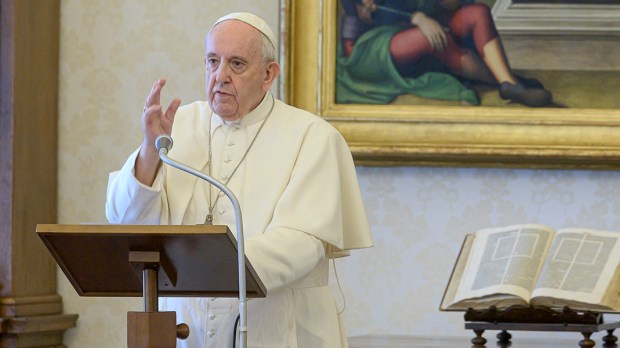“Stories influence our lives, whether in the form of fairy tales, novels, films, songs, news, even if we do not always realize it,” Pope Francis said. “Stories leave their mark on us; they shape our convictions and our behavior.”
He couldn’t have known it when he wrote this in January, but Pope Francis’ remarks for May 24’s World Communication Day were ideal for us in the time of lockdown.
Previous years have addressed important topics for our times, like the nature of online “friends,” artificial intelligence, and “fake news.” But it is fitting that, after three months of binge-watching during lockdown, Pope Francis addressed the stories we watch.
Stories “help us understand and communicate who we are,” says Pope Francis.
We know how this works from American history. Generations of Americans were introduced to the founding fathers as heroes in lessons that focused on their nobility and downplayed their sins. These stories produced a confident and conquering America.
Then, history lessons began to focus on the weaknesses of the founders and their sins, perhaps helping America to become a humbler and more reluctant world power.
Interestingly, the Hamilton musical, featuring a non-white cast and using rap in addition to traditional show tunes, changed the narrative again, so much so that its popularity prevented a plan to replace Alexander Hamilton on the $10 bill with Harriet Tubman.
“I believe that, so as not to lose our bearings, we need to make our own the truth contained in good stories,” Pope Francis added.
Since the stories we tell often have a beginning, middle and end with a resolution and moral lesson, they give us an opportunity to find meaning in events that otherwise seem meaningless.
Thus, Schindler’s List and Life Is Beautiful turn the horrors of the Holocaust into reminders that there is love even in the bleakest darkness. The film adaptation of TheLord of the Rings, a story of friendship overcoming murderous enemies, was hugely popular in part because its first part was released in America shortly after the September 11 terrorist attacks.
In our time, movies about racial justice, from 12 Angry Men to Remember the Titans and 42, can promote racial harmony.
“Often we decide what is right or wrong based on characters and stories we have made our own,” said Pope Francis.
This has been especially important in the 21st century. Movies like Minority Report, Ex Machina, or last year’s I Am Mother help us sort through the issues involved in artificial intelligence with less at stake than in the real world.
Years of end-of-the-world movies were like a dry run for the coronavirus. Because we watched everything from The Hunger Games to The Walking Dead (and World War Z, Oblivion, Ender’s Game, Elysium and the Marvel movies) we were primed to take dire global events seriously. It was surprising to me how quickly people accepted the lockdown, almost without question. It makes sense though: We had seen the movie already.
A more sinister example can be found in the violence that is in some places co-opting the cause for justice.
“Often,” Pope Francis wrote, “instead of constructive stories which serve to strengthen social ties and the cultural fabric, we find destructive and provocative stories that wear down and break the fragile threads binding us together as a society.”
I watched Joker with a friend when it came out last fall, and I wondered why no one was talking about how the movie made nihilistic riots look like a good thing. Joker isn’t the only “rioting as self-expression” movie. The Guy Fawkes masks from V for Vendetta became a worldwide symbol of protests.
All of this is an argument for watching the right kind of stories.
I’ve always been a big proponent of using movies to teach character, even making my own lists of “Movies for Future Men” and “Movies for Future Women.”
But ultimately, what Pope Francis is advocating is not just watching virtuous movies, but associating ourselves with the very greatest stories of all time.
“Sacred Scripture is a Story of stories,” said Pope Francis. “It shows us from the very beginning a God who is both creator and narrator. Indeed, God speaks his word and things come into existence.”
Our major Christian holidays give us our story.
“In the history of every person, the Father sees again the story of his Son who came down to earth. Every human story has an irrepressible dignity,” Pope Francis said.
Advent teaches us that God noticed us and came to meet us; Christmas shows us that even the value of infants is great; Easter teaches us that life in God is stronger than death; Corpus Christi teaches us that God unites us together in himself.
These are the stories that tell us who they are, because they tell us who made us, what he did for us, and remind us that he is at our side to this day.

